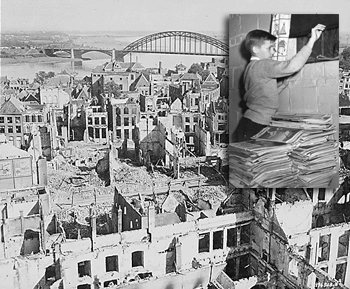|

Opa's Story
By Jacqueline
Tait
“Tell us the story, Opa. I studied the war in class, and I want
to know more,” his grandchild, Jason, said.
“Oh, all right, your father’s heard it a dozen times, but
I suppose he can hear it one more time,” Opa chuckled.
“I was a lad of fifteen, and it was 1943,” he started.
“Wow, Opa, you’re old!” Jason blurted out.
“Shhh, let him tell the story, Jas,” his other grandson,
Joshua, whispered.
“That’s okay,” Opa smiled, before he continued and
began:
During World War II the Germans were occupying Holland, including
the Hague, where we lived. My mother had explained that Hitler had
commanded his troops to construct something called the ‘Atlantic
Wall,’ which extended from the North Pole all the way down to
the Spanish border. It was a succession of fortresses all the way
to the sea. In some places they built walls and covered them with
barbed wire, excavated ditches, placed landmines and set up cannons
in preparation for an attack by England. Not many people talk about
it anymore, but tens of thousands of people living on the borders
were forced to move.
We moved to a tiny flat on the third floor overlooking the back
garden. One day I looked down and saw a couple making a sandbox for
their children. They were coming out of the first floor with buckets
of sand and dumping it into the wooden structure. I went down to their
flat and offered to help. Walking into their apartment I realized
where the sand was coming from. They had lifted the floorboards and
were shoveling clean sand from a hole in the foundation.
"I can fit into the hole better, I’m smaller, let me help,”
I told my neighbor.
I had jumped in before he could stop me, and as I grabbed a bucketful
of sand I noticed boxes and boxes brimming to the top with hand grenades.
I pretended not to notice and tried not to stare, but I was curious.
My neighbor caught my wandering eye and asked me to come out of the
space.
“Come here,” he said. “Are your parents home?”
“Yes, I was only trying to help. Please don’t get me in
trouble,” I pleaded.
"Follow me,” he said, walking with quick steps up to the
third floor.
My father was strict, and I feared what my neighbor would say. In
those days you didn’t talk back to adults, so I just followed
and kept my eyes on the floor. My mom opened the door to let us in,
giving me a questioning stare. Both Mam and Pop glared at me before
offering him a chair and something to drink.
“Hello. My name is Theodorus, but you may call me Theo,"
our neighbor said." I live on the first floor,” he said.
"My name is Lucas," my father said. "This is my wife,
Eugenie. What brings you to our home, Theo?” my father asked.
“Your son has been helping me build a sandbox for my children.
In doing so he has seen munitions I keep hidden under my floor. Let
me explain. I used to serve in our army, and now I am a part of the
underground resistance against Hitler and his troops. I want your
son to help. The only news we have access to is a radio station controlled
by the Germans. I’m sure you have seen the news posted all over
the walls in town. We get the real news from England, type it and
distribute it. I want him to help us post the truth all over town.
Hitler is brainwashing! The people deserve to hear the truth!”
“I’m tired of hiding. I want to help!” I exclaimed.
“What if he is caught? They will arrest him and shoot him!”
my mother feared.
“They hardly ever suspect young people,” Theo said.
“Please, can I do it, Pop?” I begged.
After pausing to think he replied, “You are old enough to choose
a worthy cause when you see one.”
“Opa, YOU did that?!” his grandson asked.
“Yes. Mam and Pop helped, too,” he replied. “We made
copies of the news in our flat, and I would circulate them when none
of the Nazi soldiers were around. We would post the news all over town
until the soldiers would tear them down. And my other job was to sabotage
the soldiers by delivering weapons to town, the munition hidden in a
pushcart and covered with fruit,” he explained.
He carried on: “One day, an officer caught me putting a poster
up and tried to arrest me. I must have been the luckiest man alive,
because it was the very last day of the war and the townspeople had
heard the news. A crowd had the courage to surround the officer and
distract him long enough so that I could escape. Any other day and I
could have been lined up and shot like the others, but I lived. I was
lucky enough to live and tell this story to you.”
|
